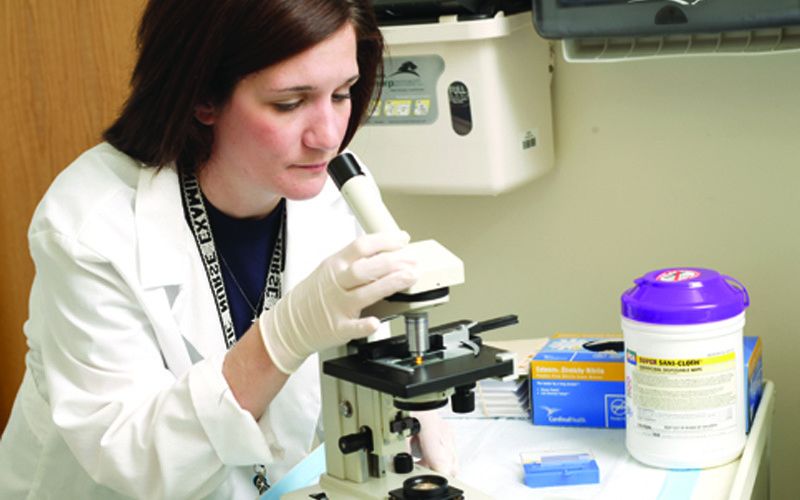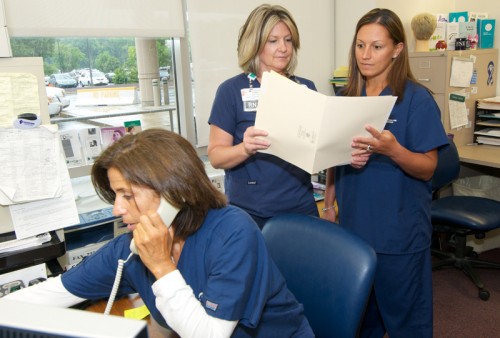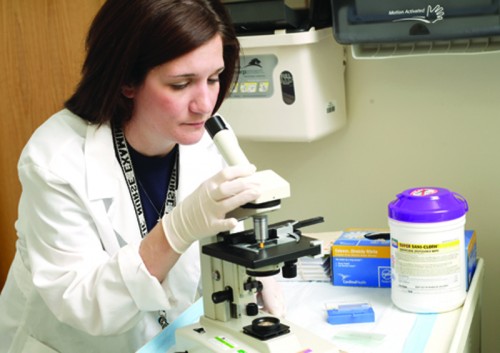Forensic nurse examiners program ‘most sophisticated and advanced in the country’


An injured woman arrives at the Christiana Care Emergency Department and says she fell and hurt herself. But her injuries don’t seem to be consistent with her story, and she’s acting worried or frightened. Might she be a victim of domestic violence who is afraid to speak up?
Collecting evidence in the Emergency Department is the domain of the forensic nurse examiner (FNE). More than 100 nurses work in the Emergency Department and Trauma Center at Christiana Care, but only 19 are specially trained in the collection of forensic evidence.
“Christiana’s forensics team of specially trained nurses gather and maintain the chain of evidence in cases of domestic violence, sexual assault and other traumas,” said Anita Symonds, MS, RN, program coordinator.
Thanks to their diligence, many crimes are discovered, and sometimes accusations are proven to be false, Symonds said.
A forensic nurse examiner often can tell if an injury has been caused intentionally. For example, if someone shows up in the ED with a gunshot wound and says it was the result of a stray bullet, a forensic nurse examiner might first try to determine whether the wound was caused by a gunshot from a few inches away or at some greater distance.
FNE team member Kelly Green-O’Shaughnessy, RN, CEN, said when an assault case is identified or suspected, the forensic nurse works around the ED staff, gathering evidence, such as photos, documenting and charting injuries, swabbing for potential DNA and taking patients’ medical history if they are able to speak.
Christiana Care’s Forensic Nurse Examiners program is at the forefront of a national trend to equip emergency nurses with forensics skills. It has been called “the most sophisticated and advanced in the country” by William Smock, M.D., of Louisville, Ky., a nationally recognized expert in gunshot wounds. He commended Christiana Care for having a forensic nurse in the trauma center at all times. “That’s a goal every trauma center in the country should aspire to,’’ he said.
The Emergency Nurses Association will honor Christiana Care’s Forensic Nurse Examiners team in September with its 2013 Team Award, to be presented in Nashville, Tenn.
Christiana Care’s forensic nursing program started in 1996 as the SANE (Sexual Assault Nurse Examiners) team. Over the years, the team’s focus expanded to include victims of domestic violence, child and elder abuse, traumas such as gunshots, stabbings and other major assaults, pedestrians struck by cars, and fire victims.
“Evidence collection is not normally part of nurse training,” Symonds said. “And the science is changing all the time. We’ve had police and lawyers come in to train us.”

Christiana Care’s FNEs receive about 100 hours of hands-on training, along with mandatory education throughout the year and monthly meetings during which a nurse presents a report on new research to keep the team up-to-date.
A trained forensic nurse can gather and preserve evidence that might otherwise be lost during treatment or long hospital stays, said Dr. Smock, who has been to Christiana Care twice to train the FNE team in the forensic evaluation of gunshot wounds. “To be able to recognize and document injuries [and] evidence is a true benefit to your patients,’’ he said. “When the perpetrator goes to court, you have the evidence documented in a manner that can be used in a legal proceeding and a forensic nurse who can testify.’’
Symonds said that testifying in court is an important part of the forensic nurse’s job — benefiting crime victims and the community.
Dr. Smock credits the leadership of Symonds and FNE medical director Gordon Reed, M.D., for their “foresight and vision’’ in developing the program.
“I’m so proud of what you’re doing,’’ he said. “You really have the model for the country.”